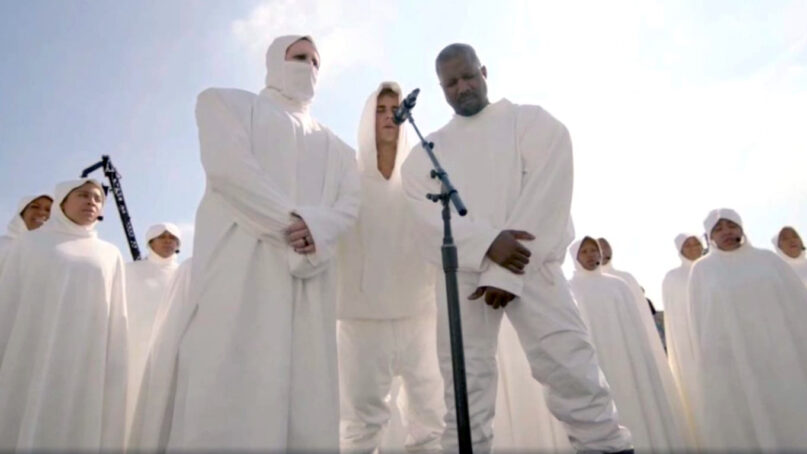(RNS) — It’s been a long time since the Kanye West Experience was primarily about the music.
And there’s been a lot of music.
But this weekend, at the latest iteration of his gospel music Sunday Service events, West (now legally known as Ye) reminded everyone via a set of Twitter posts that his main thing of late has been trolling.
Flanked by the usual Sunday Service crowd of choristers wearing all white, he was also joined by Justin Bieber, Roddy Ricch and … Marilyn Manson.
The collective online world, eagerly dissecting Ye’s constant provocations, was bewildered.
Here was Manson, accused of sexual assault by multiple women, an honorary priest in the Church of Satan, subject of one of the more bizarre urban legends, named after a cult leader … at what is, essentially, a musical Christian worship service.
Nobody blinks by this time at the presence of Bieber, who has appeared at Sunday Service events before — and has been increasingly open about his own Christian faith. Bieber makes sense. And videos showing him performing along to one of the Christian-infused tracks from Ye’s recent album “Donda” suggest someone there to enjoy singing some Jesus-y songs alongside a lot of people better at singing than he is.
Similarly, Ricch, the latest hot rapper to appear at a Sunday Service, had a feature on “Donda.” True, his most famous song isn’t exactly church fare, but he’s no Manson.
There’s a charitable read here, that Ye was trying to involve the metal rock hero in a Christian message of grace, sin, repentance and holiness — and that Manson is seeking solace in some kind of religious conversion, as Manson himself has since intimated.
It’s much easier to believe that a man accused of sexual assault, who once recorded an album called “Antichrist Superstar” dressing up like Marlon Brando from “The Island of Dr. Moreau,” might be trying to launder his reputation via gospel songs.
The question remains: What did Ye get out of it?
Manson was first linked to Ye at a “Donda” listening party at Chicago’s Soldier Field football stadium shortly before the album was released. On a stage set designed to look like Ye’s childhood home (which would eventually be set on fire, along with Ye himself, after a scene in which he marries his now-ex-wife, Kim Kardashian), Manson posed alongside rapper DaBaby.
And just stood there.
The key for both of Manson’s appearances lies in DaBaby. At the time of the Soldier Field listening party, the rapper had made some truly noxious comments, which resulted in canceled festival dates.
Inviting DaBaby and Manson to the event wasn’t about the art. It wasn’t about the music. It wasn’t even because they looked cool (they didn’t).
It was a troll, one that severely undercuts the Christian message Ye says he’s been trying to get across.
It would be easier to be charitable if this wasn’t a pattern for Ye. Since the release of 2013’s “Yeezus,” his albums have been accompanied by an endless baiting of fans, media and the general public. The chaotic rollout of “The Life of Pablo” featured wild rules for the models at the listening party, and an infamous line about Taylor Swift (and subsequent video) that spun off an entire storyline of “Keeping Up with the Kardashians” and probably inspired Swift’s weakest album.
The Wyoming recording sessions that led to 2018’s “Ye” were marked by a visit to TMZ where he seemed to suggest that slavery was, uh, a choice. Even his release of “Jesus Is King” was victim to numerous false starts.
Ye has always courted controversy, from his 2006 Rolling Stone cover dressed as Jesus, complete with crown of thorns, to the “Imma let you finish” moment at the 2009 VMAs, to the “George Bush doesn’t care about Black people” line at a live telethon.
But the last few years have felt different. Certainly, the music hasn’t been good enough anymore to distract us from the other stuff. Previous albums, seemingly beamed in from the future, made Ye’s grandiose claims of genius sound almost sensible.
But now, despite the uptick of “Donda,” his albums are largely minor blips on the radar. All his press is for the dumb things he does.
It’s hard not to think that’s by design. If he has nothing in particular to say, he knows he doesn’t need to — as long as he can troll us.
So he makes use of Manson’s infamy. Of Bieber’s sincerity. And the image that remains is Ye: standing silently, hoping to be baptized by the music, doing everything and nothing to stay in front of the cameras.
(Ryan E.C. Hamm is a writer living in Ohio who writes about music, faith, the Midwest and food, sometimes all at the same time.)





